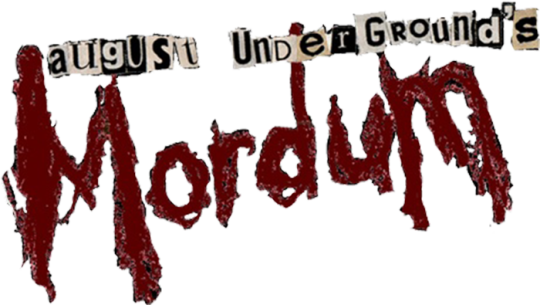|
Gross Asks Craven: "Why Make a film (Last House) like that?"
Thought most of you would dig this...
On NPR radio, Terry Gross interviewed Wes Craven a number of times. In preparation for her new interview radio show, she saw Last House on the Left... and like many (even some on HDC have expressed) found the film degenerate, depraved, etc, but not in a good way. She wanted to know who & why the hell, would anyone make a film like this, & who the hell would enjoy watching it? And that's what she asked Craven in a 1980 interview.
You don't need to see the film to know what they're talking about. These lowlifes capture these older teen girls, humiliate them, rape and murder them. The lowlifes end up staying at the girls' parents house, parents discover the crime and kill the lowlifes.
After raping and killing one of the girls, two of the murderers look at each other with a self-disgusted look. For some, that one second look makes the film great. It doesn't. It's a nefarious film, not a good one.
You might be surprised what Wes Craven says about the film. He said he didn't want to do it, & it wasn't a film he would see. Here's part of the transcript:
(or listen to the interview here: http://www.npr.org/2015/09/04/437320...tor-wes-craven)
Quote:
TERRY GROSS, HOST:
Well, David, the story of this interview begins on my vacation in Montreal with my now-husband, Francis, in 1980. We wanted to go to the movies, and the repertory house there was showing "The Last House On The Left." Now, it so happens Francis had read an essay about horror films that mentioned "The Last House On The Left" and talked about it as being an homage to the Ingmar Bergman film, "The Virgin Spring."
GROSS: Pretty classy, right? So we go to the movie, and I was totally unprepared for what I was going to see. The movie is about two escaped convicts who are incredibly sadistic. They kidnap two teenage girls, and proceed to rape, torture, disembowel, shoot, amputate - just, like, every horror imaginable. And it looks basically like a snuff film. It's so cheaply-made that it looks like two sadists who have no idea how to make a movie are documenting their own sadistic acts. And at some point I just - I couldn't take it anymore. I thought, why am I watching this? So I left the theater. I came back in eventually because - well, in part because Francis was still there.
GROSS: Yes. So I ended up watching - eventually - the rest of the film. But when I got back to Philly, I thought, I've got to talk to the person who made this film and find out, like, why did you do this? What kind of person are you? And when I called him up, I wasn't sure what I'd find on the other end, like, maybe a monster or a madman. And it turned out he was this, like, thoughtful, reflective, smart, articulate guy.
WES CRAVEN: Well, I didn't feel so hot about it, to be frank. In fact, I had a lot of qualms about doing such a thing. However, at the time, I was driving a cab in New York, out of work and had a wife and two kids, and I was, at the same time, really excited about the idea of being offered a motion picture to write, direct and edit, especially since my last job had been, you know, a very rudimentary job in a film. In other words, I was very new to the business and this was an extraordinary stroke of luck that they offered a film to make from top to bottom. So I had very mixed feelings about it. I didn't want to do - particularly, a violent film. On the other hand, I did want to do a film very much.
GROSS: Let me tell you about my reaction, and tell me what you think of this. I was sitting there saying, gosh, this is really awful. I don't want to see this. This is just going to give me images for nightmares. Who needs this? Why am I doing this to myself? And I figured my alternative reaction was to work really hard at detaching myself from what was going on on the screen. And I figured, well, why should I use all that energy to undo an emotion that's probably really appropriate? I mean, I figured it was probably appropriate to really be horrified at what I was watching.
CRAVEN: Well, it sounds like a healthy reaction to me. You know, I really think that's it's not the sort of movie that I would go to, I don't believe. At the time that I made it, it was not the sort of movie I went to. My feeling when I was making it is, OK, if these people are going to be paying money to go in and see somebody killed - which, in effect, you're doing when you're - anybody is doing if they go to a movie that they know is a murder thriller. Then they're going to see what I feel this business is really like. As I mentioned to someone once before, it was during the height of the Vietnamese War, and I felt like America as a whole country - myself was becoming immune to violence. We were watching it - I literally was watching people dying on my television screen while I was eating dinner, you know, and several times caught myself, you know, with mouthfuls of food and nausea coming over me with - what? You know, this is horrible. I mean, this is really horrible.
GROSS: I really understand what you're saying, and I know that the movies I grew up on - even, like, the World War II and World War I movies, people were killed without any blood ever coming out.
CRAVEN: That's right.
GROSS: I think there's, like....
CRAVEN: And even when blood does come - did come out - when it first came into the movies in a big way with Peckinpaw, he used slow motion, and the squibs somehow weren't really...
GROSS: Very stylized.
CRAVEN: So it was very stylized and ballet-like. And I still felt like you didn't really get down to the essence of the act, and that was depriving a living thing, a human being, of its life, of its very life force. And, you know, it went beyond a simple matter of pulling the trigger. It went down into the - you had to look at that thing struggling to maintain that life, even though it had been shot or stabbed...
GROSS: Right.
CRAVEN: ...Or whatever. You know, it went back to something that happened to me when I was a kid. I don't know whether you'd be interested in hearing it, but, at one point in my life, when I was living in, you know, kind of a poor neighborhood. We lived next to a railroad yard and I don't think I - probably looking back on it - was very happy with my life. But anyway, one thing I found to sort of get rid of my craziness was, I got a mail-order bow and arrow set. I mean, you know, a legitimate one. And I started hunting. And the only thing to hunt there was rats because the railroad yard had this area where they kicked grain out of cattle cars. And there were a lot of rats. And I started - almost by accident - started hunting rats. And I went a whole year before I got near to even hitting a rat. It turned out they were extremely canny, very, very alert. And I never got close to one for the first six months because I wasn't that good a shot. But I kept practicing, I kept hunting these things and kept wishing I would get one. Finally one evening, almost dark, I took a shot at a rat after stalking it for half an hour, after sitting quietly and waiting for it to come out just right. I shot and I hit the thing. And instead of - at that moment, this little tiny animal let out this enormous scream that echoed over all the boxcars in the stockyard and chilled me to the bone. I realized that what I had been thinking and fantasying was totally different from what I had actually done. And not only that, but the thing was still alive. And I went down and I said, well, it is a rat, you know? I - nobody likes rats, but I had to kill it. And it took a lot of killing to kill that rat and it continued screaming for a long time. I'll tell you, when I was done I was totally drained. I was totally shocked by what - not only what I had done for amusement, but how fiercely that thing struggled to stay alive. And that moment never left me. You know, I never again hunted, never killed. But I remembered how hard just a rat struggled to be alive. And somehow I was able to transfer that to, you know, the thought of any human being - anything, how fiercely we all hang onto life. You know, I...
GROSS: I understand what you're saying about films being bloodless sometimes or being too stylized and you don't really understand what murder is really like and how horrible it is and how difficult it actually is to kill someone, but I was looking around in the audience when I saw "Last House On The Left," and somehow the range of reaction that the audience seemed to have was somewhere between immunity to the violence and actually digging what was happening. And I don't know what kinds of audiences you've seen your film with, but how do you feel about that type of reaction to it - immunity or enjoyment?
CRAVEN: Well, I've never seen immunity, frankly. I've seen people - everything from shocked to disgusted to nauseated and - or anger, it's a lot of anger. And the other reaction I've seen sometimes is cheers when what those people would call the good guys - the parents and so forth - turn the tables and kill the bad guys. You know, I find it scary. I've heard about audiences like that, where they're all up on their feet and cheering and so forth. I've never seen an audience that was cheering when the "bad guys," quote-quote, were killing the girls. But, you know, I would find that chilling. That certainly wasn't what I intended. But I've heard about that.
|
__________________
.
.
.
.  
Last edited by Sculpt; 09-05-2015 at 01:20 PM.
|




